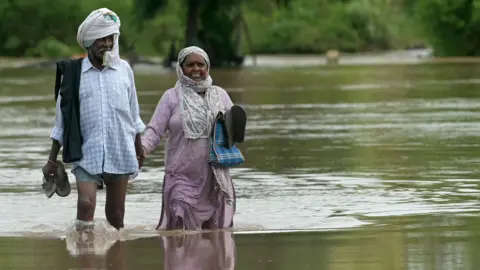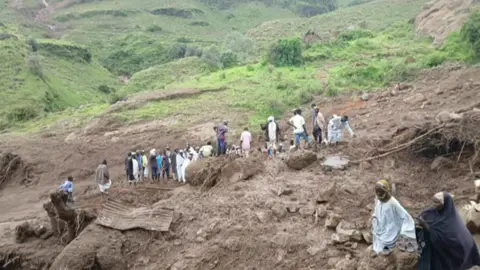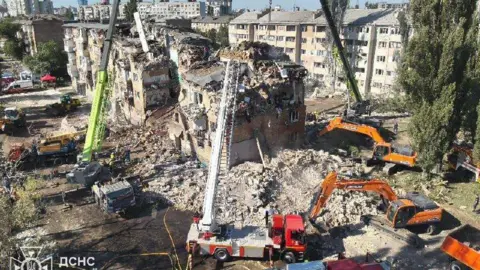In the wake of devastating flash floods that inundated central Texas on Friday, the death toll has tragically surpassed 100, raising alarm as additional thunderstorms loom over the area. Rescuers are scouring mud-encased riverbanks, with hopes dwindling of finding any more survivors four days after the disaster.
Among the deceased are at least 27 young campers and staff from Camp Mystic, a Christian summer camp for girls. Ten campers and a counselor remain unaccounted for as the search intensifies. The overwhelming loss of life, including that of camp director Richard Eastland, who died attempting to save children, has left the local community reeling. “He died a hero,” remarked local pastor Del Way, emphasizing the gravity of the tragedy.
Kerr County, where the floods hit hardest, reported 84 confirmed fatalities, half of which are children. The ongoing threat of slow-moving thunderstorms, predicted by the National Weather Service (NWS), has sparked concerns about renewed flooding, complicating the recovery efforts.
Debate surrounding the government's preparedness for such catastrophes has emerged, especially in light of claims tying budget cuts at the NWS to the tragedy’s severity. White House Press Secretary Karoline Leavitt dismissed accusations linking federal budget reductions to the disaster, asserting that timely warnings were issued prior to the flooding.
President Trump, expected to visit Texas soon, sidestepped accountability for the situation, describing it as a "100-year catastrophe." Meanwhile, Texas Senator Ted Cruz cautioned against partisan blame, advocating for unity in response efforts.
Community advocates like Nicole Wilson are launching petitions for flood sirens in Kerr County, with officials acknowledging that such measures could have potentially saved lives. The conversation around disaster preparedness has gained urgency following this tragic event, highlighting the need for enhanced safety systems in vulnerable areas.
From across the globe, condolences continue to flood in, including a heartfelt letter from King Charles III extending sympathy to the victims' families. As Texas mourns, it becomes increasingly clear that long-term solutions must be prioritized to prevent future tragedies of this scale.
Among the deceased are at least 27 young campers and staff from Camp Mystic, a Christian summer camp for girls. Ten campers and a counselor remain unaccounted for as the search intensifies. The overwhelming loss of life, including that of camp director Richard Eastland, who died attempting to save children, has left the local community reeling. “He died a hero,” remarked local pastor Del Way, emphasizing the gravity of the tragedy.
Kerr County, where the floods hit hardest, reported 84 confirmed fatalities, half of which are children. The ongoing threat of slow-moving thunderstorms, predicted by the National Weather Service (NWS), has sparked concerns about renewed flooding, complicating the recovery efforts.
Debate surrounding the government's preparedness for such catastrophes has emerged, especially in light of claims tying budget cuts at the NWS to the tragedy’s severity. White House Press Secretary Karoline Leavitt dismissed accusations linking federal budget reductions to the disaster, asserting that timely warnings were issued prior to the flooding.
President Trump, expected to visit Texas soon, sidestepped accountability for the situation, describing it as a "100-year catastrophe." Meanwhile, Texas Senator Ted Cruz cautioned against partisan blame, advocating for unity in response efforts.
Community advocates like Nicole Wilson are launching petitions for flood sirens in Kerr County, with officials acknowledging that such measures could have potentially saved lives. The conversation around disaster preparedness has gained urgency following this tragic event, highlighting the need for enhanced safety systems in vulnerable areas.
From across the globe, condolences continue to flood in, including a heartfelt letter from King Charles III extending sympathy to the victims' families. As Texas mourns, it becomes increasingly clear that long-term solutions must be prioritized to prevent future tragedies of this scale.





















